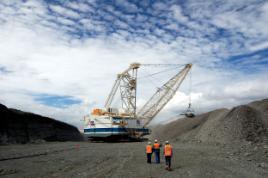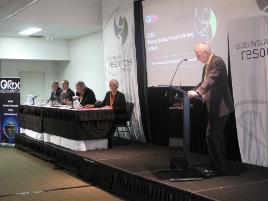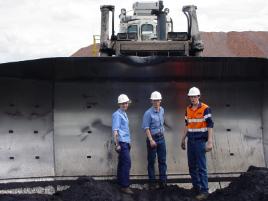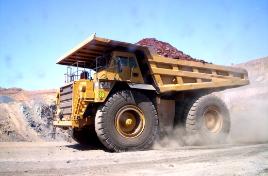It takes more than a shovel - diverse research 'behind the seams'
Published on 23 June, 2011
CQUniversity's footprint overlaps the Bowen Basin so it's no surprise there's a mining-related research focus across the institution. The real surprise is just how diverse the research needs to be to help underpin such a vital industry.
Our researchers including Dr Sanath Alahakoon are now focused on Hybrid Electric Systems for Heavy Machinery, as most of the heavy machinery used in resource industries is powered by Internal Combustion (IC) engines using fossil fuels.
"It is well known that an IC engine driven system cannot be run at the operating point of maximum efficiency all the time. This causes an IC engine to emit significant amounts of greenhouse gases during its operation," Sanath said.
A recent symposium provided valuable information about the basic hybrid electric technology, its cost-benefits in terms of reducing operational and maintenance costs and its potential to reduce carbon emissions. One of Sanath's colleagues, Professor Gopinath Chattopadhyay is also leading the charge to help industries gain maximum performance and value from their assets.
Another innovative project is utilising floating aquaponic units with local native plants to remove excess nutrients from ponded water on mine sites, to reduce the spread of blue-green algae outbreaks. Our Ecotoxicology and Industrial Waters group is providing leadership in this area, guided by Associate Professor Larelle Fabbro.
Water quality is also the focus of researcher Ben Kele who believes he can find a better filter mixture for the treatment of water used in the coal seam methane gas process, crucial for the LNG industry. Ben is testing a range of filter mixtures to produce water suitable for sustainable agricultural use.
"The concentration of salt is the major water quality issue limiting the beneficial use of coal seam gas water," he explained. "The salinity and sodicity concerns of associated water need to be addressed before the water can be reused for agricultural purposes."
Our Sustainable Regional Development team has recently completed a study, seeking the best way to calculate, report and reduce greenhouse gas emissions from the trucking industry. Researchers analysed fuel consumption patterns across a fleet of trucks, including the different types of fuels and supply sources. This information was used to build a new reporting worksheet under the National Greenhouse and Energy Reporting Scheme (NGERS).
Our Centre for Railway Engineering is showing how incremental changes can also save millions of dollars for railway systems, thanks to researchers squeezing out every possible performance enhancement. Sometimes tiny adjustments are enough when translated to hundreds of trains and thousands of kilometres of rail lines.
Our sleep and shiftwork specialists are helping devise strategies to combat fatigue, especially in relation to road travel between mining workplaces and coastal weekenders. And in related news, we have allocated fresh funding to assess the economic impacts of flood interruption to transport corridors. 
CQUni research is supporting the people who support the industry. Image courtesy Queensland Resources Council
Regional development economists are at work to find ways for mining towns to 'thrive', not just survive, ensuring they have both 'bonders' who can create social glue and 'bridgers' who have links to relevant industry sectors. A major tool has been our Population Research Laboratory and the ongoing efforts to understand aspirations, perceptions and preferences of mining communities.
Senior Research Fellow Evan Yabsley has outlined the challenge, saying "successful towns will be able to express goals to flag why people would want to come to live and participate in the community, such as developing a consistent message about what makes any given town unique, its unique blend mix of tangible and intangible elements, such as recreational, historical and aspirational content".
A focus on the social impact of mining is a strong one. CQUniversity recently co-presented a conference on Sustainable Development in Resource-Intensive Regions, in association with Australian public policy think tank the EIDOS Institute and the University of Newcastle.
The University support for mining communities has been further enhanced with news of $5.53 million in Commonwealth funding to enable partnerships with other universities, to help deliver better health outcomes.
In his role as a resource economist, CQUniversity's Professor John Rolfe recently joined five other economics professors appearing before the Australian Senate committee on the proposed mining tax.
Professor Rolfe and his team also contributed the research behind a recent Queensland Resources Council report about 'mining's turbocharging of the economy'. The research identified the amount of direct stimulus and indirect economic impacts of the resources sector on every regional area in Queensland.
CQUniversity has been working with a range of partners to present 'Women in Hard Hats' Careers Awareness Workshops, helping females workers to cash in on coal jobs, and diversifying the pool of talent available to the resources industry.
The University is pushing for more 'seamless' education pathways to underpin the resource industries. It not only has strong Pathways projects but is also progressing a bid to create a dual sector institution through amalgamation of CQUniversity and CQ Institute of TAFE.
In Gladstone and Mackay, the place-based Pathways projects are a DEEWR-funded CQUniversity-hosted initiative to develop a seamless staircase for lifelong learning.
These pathways will provide a platform to develop solutions to support the local labour recruitment, development and retention strategies of business and industry in Central Queensland, benefitting all types of resource industries.
Pathways project representatives Lyn Forbes-Smith and Associate Professor Col Greensill both say the skills shortage stalking the mining and resources industries is likely to restrict production and impact on safety unless it is addressed, so workforce skills development is becoming a crucial part of the supply chain.
As well as catering for young people keen on entering the workforce, the University provides professional development educational opportunities for practitioners in the areas of Mining, Engineering, Maintenance Management, Occupational Health & Safety, Environmental Science and Built Environment.

CQUni and QRC have help drive the series of QREX events.
A key factor is the availability of distance education and flexible learning options, enabling study to fit around work and family commitments.
CQUniversity works in close collaboration with industry to provide relevant and current tertiary qualifications. Our programs are renowned for producing work-ready graduates and offer educational pathways to suit nearly every requirement.
A classic example is the University's collaboration with Anglo Coal Australia, including the innovative Mining Associate Program.
Under the program, now available for surface and underground miners and well as safety specialists, ‘mining associates' can gain practical mine site experience and registered training which is integrated with study in CQUniversity's Associate Degree of Engineering (Mining).
The mining associates are able to support mining professionals engaged in mine planning, coal quality management, surveying, environmental monitoring, site projects and other areas as required. CQUniversity also has an existing mining engineering partnership degree (with University of Queensland).
Meanwhile, CQUniversity has partnered with organisations including the Queensland Resources Council (QRC), Orica Engineering, Independent Australian Laboratories and Hail Creek Mine to invest in scholarships to support the next generation of Central Queensland engineers and environmental scientists.
The Queensland minerals and energy sector's continuing need for skilled employees has also been given top priority by CQUniversity and the QRC through a Memorandum of Understanding designed to address skills shortages in the Queensland resources sector. CQUniversity and the QRC have also been key drivers of the successful QREX Queensland Resources Expo series.




